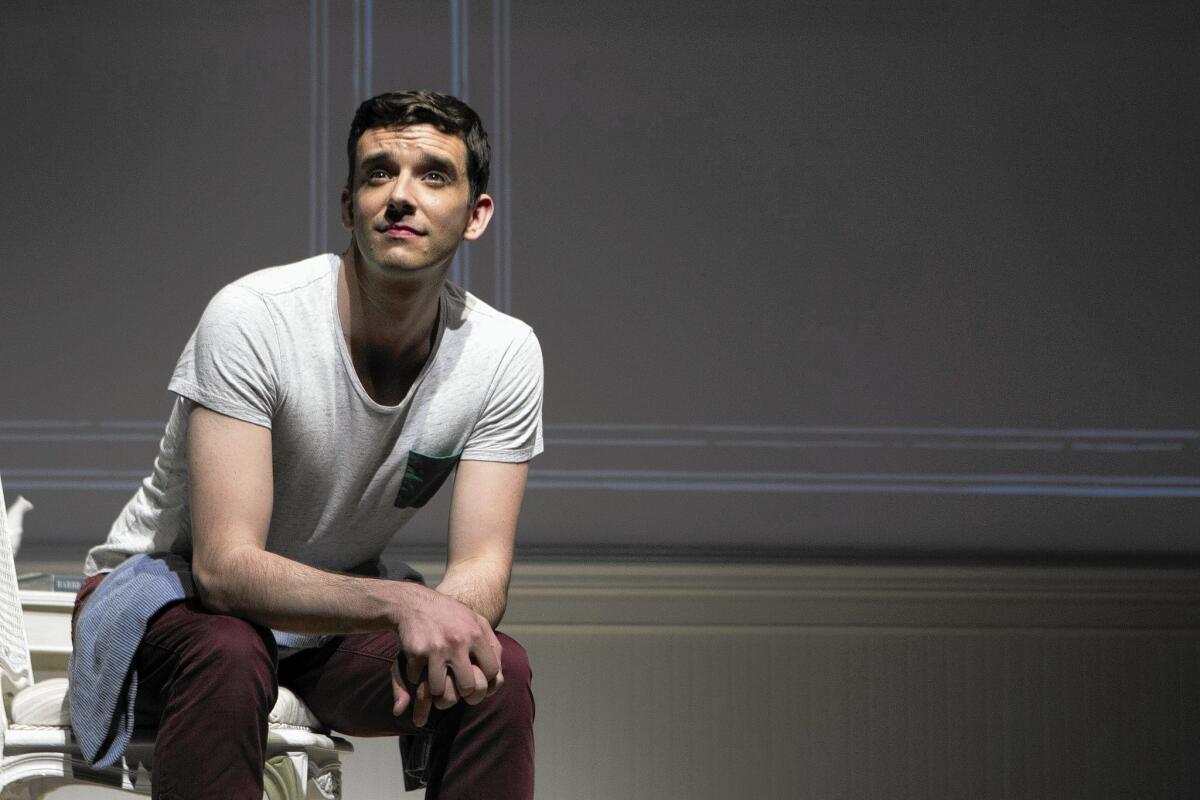Review: ‘Buyer & Cellar’ is a pleasant, fond sendup of Streisand

- Share via
Jonathan Tolins’ hit off-Broadway play, “Buyer & Cellar,” comes with a couple of disclaimers before its star Michael Urie can conjure into existence the one and only Barbra Streisand.
As Alex, the narrator and protagonist of this audience-tickling show that opened Sunday at the Mark Taper Forum, Urie establishes straightaway that this drama, set in the basement shopping mall of Streisand’s palatial Malibu home, is “a work of fiction.” None of this could “possibly have happened with a person as famous, talented and litigious as Barbra Streisand,” he explains.
What’s more, he wants to make clear that this one-actor play, directed by Stephen Brackett, isn’t a drag act. There will be no wigs, no sequins, no lip-syncing. In short, he’s not going to “do” Babs for us.
On a stage sparely furnished with a cafe table, chair and bench, Urie etches Barbra with only a few punctuating mannerisms. When this lanky actor, best known for his work on the sitcom “Ugly Betty,” leans in for the umpteenth time with a shrug of one shoulder, it’s Barbra asking, “Am I right or am I right?” When a cheek juts out and the other side of his face falls, it’s Barbra acknowledging an irony that needs no words. And when a layer of invisible hair gets flipped, it’s an icon reasserting her glamour in the face of ineradicable insecurities about her looks.
The premise of this bouncy tale is outlandish, and both Tolins and Urie delight in its playful absurdity: Alex, a struggling Los Angeles-based gay actor, gets hired to man the shops in Streisand’s sham mall, which is the scheme she comes up with to house her vast collections of antique dolls, vintage dresses and old stuff too saturated with memories and too darn expensive to throw away. A frozen yogurt machine serves as her food court.
The idea for the play was born out of Streisand’s 2010 book “My Passion for Design,” a coffee table tome with luscious photos detailing the assembly of the dream home she created in Malibu. As Alex notes, reading from the front flap of the volume with the tongue-in-cheek reverence that is the prevailing spirit of this affectionate though hardly toothless sendup, this is the “refuge she has longed for since the days when she shared a small Brooklyn apartment with her mother, brother and grandparents …”
The irony of one of the world’s most powerful and famously exacting celebrities still nursing childhood grievances about her impecunious upbringing while living in unrivaled splendor provides a good portion of this play’s rocket fuel.
If nothing is ever quite up to snuff, it’s because this Barbra, whose only doll as a child was a hot water bottle, can’t Photoshop her past into something quaintly picturesque. And if she’s still complaining about the way she was made to feel ugly as a girl even as she has become a universal emblem of unconventional beauty, it’s because those early wounds left scars that no makeup can hide.
Barry, Alex’s boyfriend, “an under-employed screenwriter and habitual TCM watcher,” worships at the Streisand altar and so is naturally thrilled to hear Alex’s daily reports about his new job. But not even he can tolerate the way “this incredibly privileged, powerful woman still acts like a Dickensian victim.”
“Yes, her father died and that’s terrible, and yes, she lived in a cramped apartment and her stepfather Louis Kind never liked her, but she was famous and had the world at her feet by the time she was 19,” he says with rising exasperation. “At what point is that not enough for her?”
The play could be considered unkind to Streisand were it not for the touching relationship that develops between two lonely outsiders who, drawn to the make-believe world of show business, become daily playmates in an improvised game of shopping. Streisand, pretending to be a customer, haggles over the price of a doll. Alex, pretending to be the clerk of an actual store, stands firm.
“It was so fun playing with you that way,” she tells him. “I love doing that. That’s all acting and directing is, you know. It’s a form of play, you know what I mean?”
Urie lays the campiness on a bit thick at times, flirting with gay stereotypes that in a different context might raise hackles. There’s a bit of audience pandering going on, but he’s such a lively, spry and good-humored performer that it’s easy to accept that soloists on stage often resort to bright colors to distinguish among their various characters.
Tolins’ play is very amusing on the subject of Los Angeles and the plight of actors waiting for their big break. Yes, it has its slow patches and weakly finds its dramatic resolution in a punch line (an admittedly funny one, but a cop-out involving throw pillows nonetheless). But it is redeemed by the emerging friendship that it poignantly depicts, thanks to a winning actor and a playwright who ultimately chooses sincerity over easy satire.
My friend and I debated during the drive home after Sunday’s opening whether Streisand should see “Buyer & Cellar” now that it’s in L.A. We both agreed that we’d skip it if we were Streisand. On the other hand, the show had a way of increasing our fondness for this irreplaceable star.
----------------------------
‘Buyer & Cellar’
Where: Mark Taper Forum, 135 N. Grand Ave., L.A.
When: 8 p.m. Tuesdays-Fridays, 2:30 and 8 p.m. Saturdays, 1 and 6:30 p.m. Sundays. Ends Aug. 17.
Price: $25-$85 (Ticket prices subject to change.)
Contact: (213) 628-2772 or https://www.centertheatregroup.org
Running time: 1 hour, 40 minutes with no intermission
More to Read
The biggest entertainment stories
Get our big stories about Hollywood, film, television, music, arts, culture and more right in your inbox as soon as they publish.
You may occasionally receive promotional content from the Los Angeles Times.











